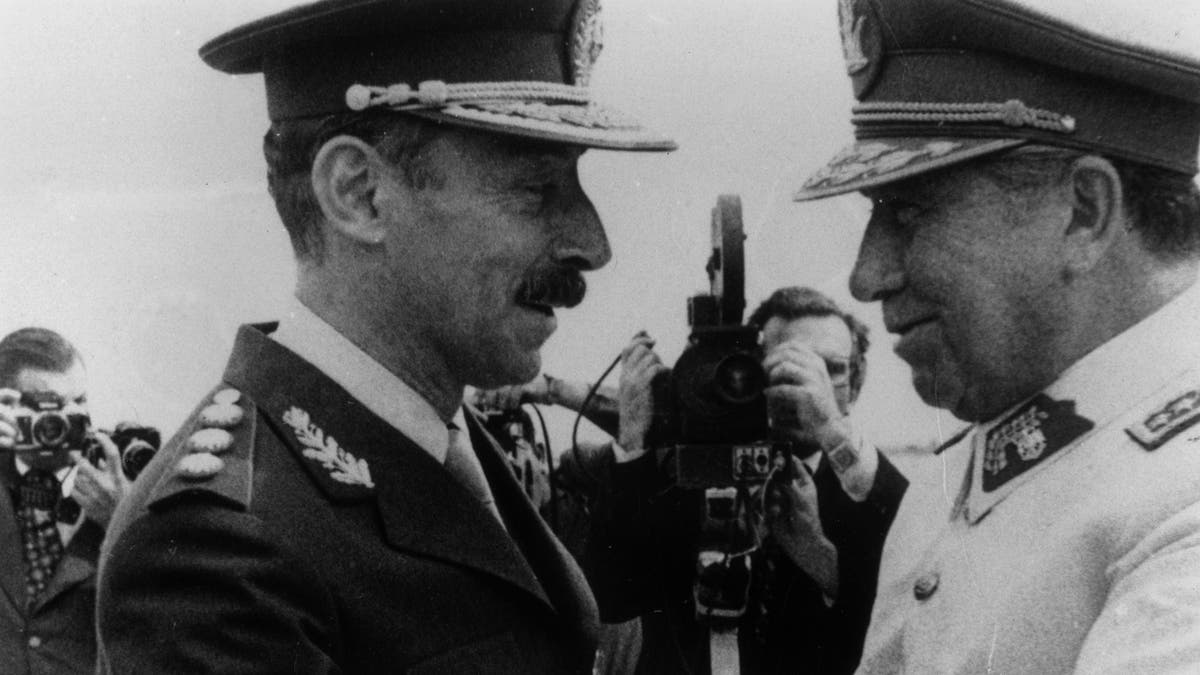
General Augusto Pinochet (right), the President of Chile with General Jorge Videla, the President of Argentina in Mendoza, Argentina. (Photo by Keystone/Getty Images)
Former Argentine dictator Jorge Rafael Videla admitted for the first time to ordering the killing and disappearing of thousands of government opponents during the country’s Dirty War, according to local press reports.
“Let’s say there were about 7,000 or 8,000 people who had to die in order to win the war against subversion,” Videla said during a series of interviews with journalist Ceferino Reato. “We couldn’t execute them, but we also couldn’t take them to the courts.”
Human rights organizations that document the abuses of the military regime put the figure at 30,000.
Videla admitted his government disappeared political opponents and in some cases stole the victims’ babies—practices he justified as exigencies of war.
“There was no other solution,” Videla said. “We agreed that there was a price to pay to win the war and we needed to keep it quiet so that the country wouldn’t see what was happening.”
Though Videla recognized the targeted killings of thousands of opponents, he disputed the accuracy of the term “desaparecido”—an emotionally charged word for Argentines meaning “disappeared one,” a reference to the people killed by the military dictatorship.
“In every war, there’s a list of casualties, killings and disappearances, people whose whereabouts are unknown,” Videla said. But the word desaparecido “became an all-encompassing term, referring to something dark that we wanted to keep hidden… a mysterious thing. And it isn’t. It’s a lamentable result of war.”
The former general denied that the government systematically stole the children of the opponents it killed, but recognized when pressed by Ceato that it occurred with regularity.
Placing the children of killed opponents in the care of supporters of the military government amounted to an act of charity, according to Videla.
Videla remains locked up in a federal prison outside the capital of Buenos Aires, where he is serving a life sentence for ordering the killing and torture of political dissidents.
Despite his conviction and an abundance of documentation of the military government’s use of torture and extrajudicial killings of civilians, he has until now refused to admit wrongdoing. Reato is the first journalist to get Videla to confess on the record – a feat the reporter accomplished in nine separate interviews conducted from October 2011 until March of this year.
Videla decided to break his silence partly for political reasons, according to Reato. He and other military figures convicted of dictatorship-era human rights crimes thought Eduardo Duhalde might grant them amnesty if he were elected last year.
But the left-leaning Cristina Fernández de Kirchner, an outspoken opponent of the military dictatorship, cruised to a first-round victory. Without the prospect of an amnesty in the near future, Videla, 86, saw little reason to hold his silence, Reato reports.
“I don’t regret anything and I sleep very well every night,” Videla said, but added “I have a weight on my soul and I would like to make a contribution, to take responsibility in a way that could help society understand what happened and to make things easier on officers with lower rank than myself.”
Follow us on twitter.com/foxnewslatino
Like us at facebook.com/foxnewslatino








































